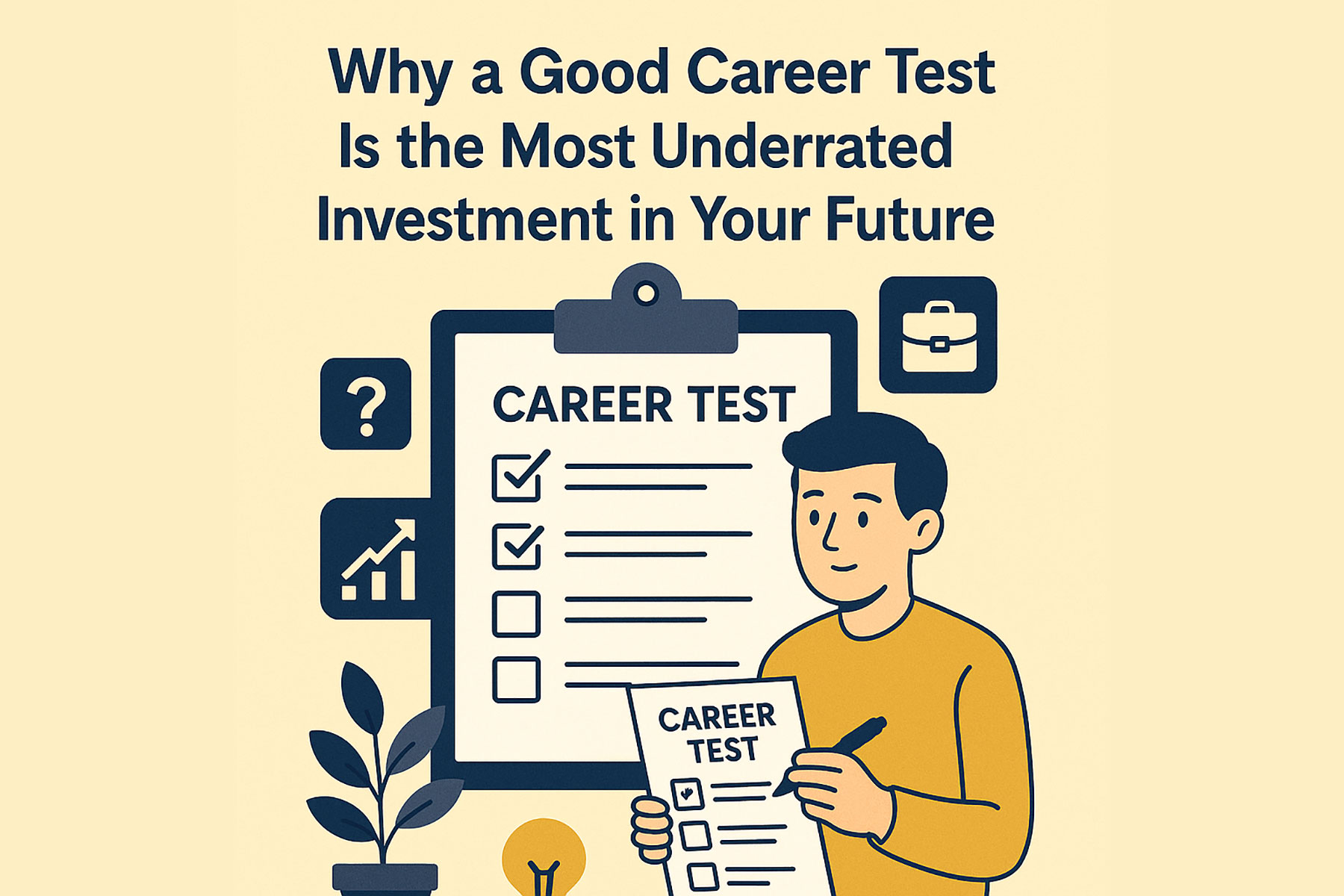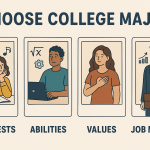Career News
Why a Good Career Test Is the Most Underrated Investment in Your Future

Why a Good Career Test Is the Most Underrated Investment in Your Future
By Daave Esien
Introduction: The Persistent Problem of Career Ambiguity
Every year millions of students, job-seekers, and mid-career professionals stand at the crossroads of “What should I do next?” In spite of unprecedented access to information, we still see alarming rates of career dissatisfaction and costly occupational pivots. A scientifically designed career test offers a data-driven antidote to this confusion. Far from being a fluffy personality quiz, a modern career test is a calibrated instrument that helps people align interests, motivations, and aptitudes with market realities.
Who Should Take a Career Test?
- High-School and College Students – Early guidance saves tuition, time, and frustration by focusing academic choices on genuine interests.
- Early-Career Professionals – A career test can validate that your first job is a fit or warn you before sunk costs escalate.
- Mid-Career Changers – People in their thirties and forties often realize their initial field no longer excites them; a career test illuminates alternative paths.
- Executives Seeking Fulfillment – Even senior leaders use assessments to pivot into consulting, board roles, or purpose driven projects.
- Organizations – Employers deploy career tests to improve hiring, succession planning, and employee engagement.
In short, anyone facing a career decision whether entering, re-entering, or redirecting their trajectory benefits from a well-constructed career test.
Why People Use Career Tests
- Clarity – Reduce ambiguity by translating intangible preferences into a concrete profile.
- Confidence – Decisions feel less risky when backed by empirical evidence.
- Speed – A comprehensive career test condenses months of self-reflection into 15 quick minutes.
- Strategic Fit – It links personal drivers to roles that yield long-term satisfaction and performance.
- Market Insight – Top platforms overlay interest data with salary curves, demand forecasts, and automation risk.
How Modern Career Tests Work
- Psychometric Foundations
A high-quality career test employs classical test theory or, better yet, item-response theory (IRT) to ensure reliability and validity. Each item (question) is calibrated for difficulty and discrimination, allowing shorter adaptive assessments without sacrificing precision.
- Multidimensional Profiling
Most career tests measure multiple facets:
- Interests (what you enjoy)
- Personality traits (how you behave)
- Values & motivations (why you persist)
- Abilities (what you can do)
The strongest instruments integrate these layers into a holistic profile rather than reporting them in isolation.
- Occupational Mapping
After scoring, the test algorithm compares your profile to a vast database of occupational “signatures.” A good career test doesn’t merely spit out generic categories; it ranks thousands of roles by percentile fit and explains the “why” behind each suggestion.
The Science Behind Careertest.com — Powered by the MAPP Assessment
Careertest.com’s engine is built on the Motivational Appraisal of Personal Potential (MAPP®) a research-backed method trusted by millions since 1995. MAPP doesn’t just catalog what you like; it uncovers the motivational DNA that keeps you engaged for decades.
| Pillar | How MAPP Works | What It Means for You |
| Motivational Trait Mapping | Scores you across 71 motivational factors blending interests, temperament, and work style. | Differentiates a data-oriented creative from a socially-oriented creative crucial when matching roles such as Business Analyst vs. Brand Strategist. |
| Primary–Secondary Alignment | Identifies a dominant work orientation and a secondary style, then evaluates their dynamic. | Recommends careers that honor both drives e.g., UX Research (creative + analytical). |
| Benchmarking to 38 K+ Roles | Compares your profile to a proprietary database richer than public sources like O*NET. | Generates percentile-fit scores so you see exactly where you thrivetoday and in the future labor market. |
Bottom line: MAPP turns the classic Holland Code into a micro-motivation map, then Careertest.com overlays live wage data, growth outlook, and automation risk to produce recommendations that are both inspiring and viable.
Why Career Tests Help More Than Guesswork
- Evidence-Based Self-Awareness – Objective scores often surface hidden strengths or overlooked passions.
- Reduced Cognitive Bias – People tend to over or under-estimate their fit for glamorous careers; a career test counters bias with data.
- Actionable Road-maps – Modern platforms suggest micro-credentials, networking tactics, and step-by-step transition plans.
- Language for Stakeholders – Students can show advisors their profiles; employees can share results with managers to co-create development plans.
- ROI on Education – Aligning studies with a validated career direction lowers dropout rates and student-loan waste.
Spotlight on the MAPP Assessment (Assessment.com)
Among the many options, the MAPP Assessment from Assessment.com remains a gold standard. Developed in 1995 and continually refined, MAPP short for Motivational Appraisal of Personal Potential focuses on 71 motivational factors that drive career satisfaction. Unlike tests that simply measure “likes and dislikes,” MAPP uncovers the deeper motives that sustain engagement over decades.
Why MAPP Stands Out
- Adaptive Design – MAPP uses forced-choice items that minimize social-desirability bias, ensuring authentic responses.
- Granular Insights – It expands the classic Holland RIASEC model into micro-motives, giving nuanced differentiation between, for example, a data-oriented creative and a socially-oriented creative.
- Extensive Job Database – MAPP compares your motivational profile to more than 1,000 career families and 20,000 specific job titles, surpassing many public databases in breadth and depth.
- Action-Oriented Reporting – Beyond scores, users receive personalized career-fit narratives, salary data, and suggested skill-gap trainings.
- Global Credibility – With millions of test-takers and translations in multiple languages, MAPP has robust normative data to benchmark your results.
As an expert reviewer, I appreciate how MAPP bridges rigorous psychometrics with practical career planning. Clients routinely tell me that its feedback “feels like someone finally put words to what I’ve sensed all along.” That is the hallmark of a powerful career test.
Integrating Career Tests into Coaching or Self-Guided Plans
- Pre-Work – Clarify decision goals: Are you choosing a major, evaluating a promotion, or considering entrepreneurship?
- Take the Career Test – Invest time to answer honestly; avoid reading into questions or gaming the system.
- Digest Results – Don’t rush. Read narratives, highlight surprising insights, and consider emotional reactions.
- Research Matches – Deep-dive into top-ranked roles: day-in-the-life videos, informational interviews, and internship possibilities.
- Build a Development Map – Outline skills to gain, networks to join, and milestones to hit.
- Reassess Periodically – Interests evolve; retake a career test every 3–5 years or after major life events.
Common Myths About Career Tests
| Myth | Reality |
| “They box me in.” | Quality assessments reveal range, not limits. |
| “Only students need them.” | Mid-life pivots and retirement planning benefit equally. |
| “Free quizzes are fine.” | Unvalidated tools mislead; a psychometrically sound career test saves time and money. |
| “Results are permanent.” | Motivations can shift; retesting provides updated guidance. |
Choosing the Right Career Test
- Check Validity Evidence – Look for peer-reviewed studies or technical manuals.
- Confirm Occupational Breadth – More roles equal sharper fits.
- Review Reporting Depth – Actionable next steps matter.
- Assess Support Options – Coaching add-ons amplify results.
The MAPP Assessment excels on every criterion, making it my top recommendation for individuals and organizations alike.
Real-World Impact Stories
- Alisha, 29, Retail Supervisor → Data Analyst – MAPP revealed a strong pattern-recognition drive; nine months later she landed a junior analyst role with a 40 % salary bump.
- Marco, 17, High-School Junior – Thought he wanted mechanical engineering; the career test showed a better fit as a Surgeon, saving time and tuition due to college majors changes.
- Jia, 45, Healthcare Veteran → UX Research Lead – MAPP highlighted high empathy plus investigative curiosity; after a UX bootcamp she now designs patient-centric digital tools.
Conclusion: Let a Career Test Light the Way
A well-designed career test is not a magic wand; it’s a compass calibrated by psychological science. When you align who you are with what the world of work needs, you gain motivation, performance, and lasting satisfaction. Whether you’re a student, a mid-career changer, or an employer seeking fit, the right career test—especially one as robust as the MAPP Assessment turns foggy intuition into a clear trajectory. Don’t leave your future to chance; let psychometrics guide your next move.





